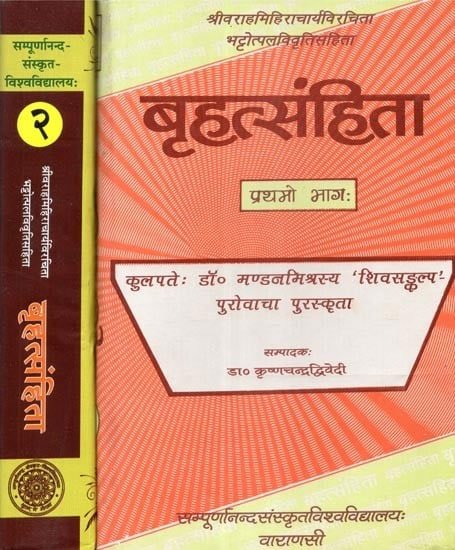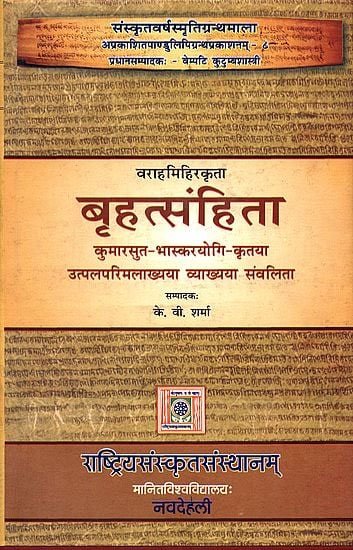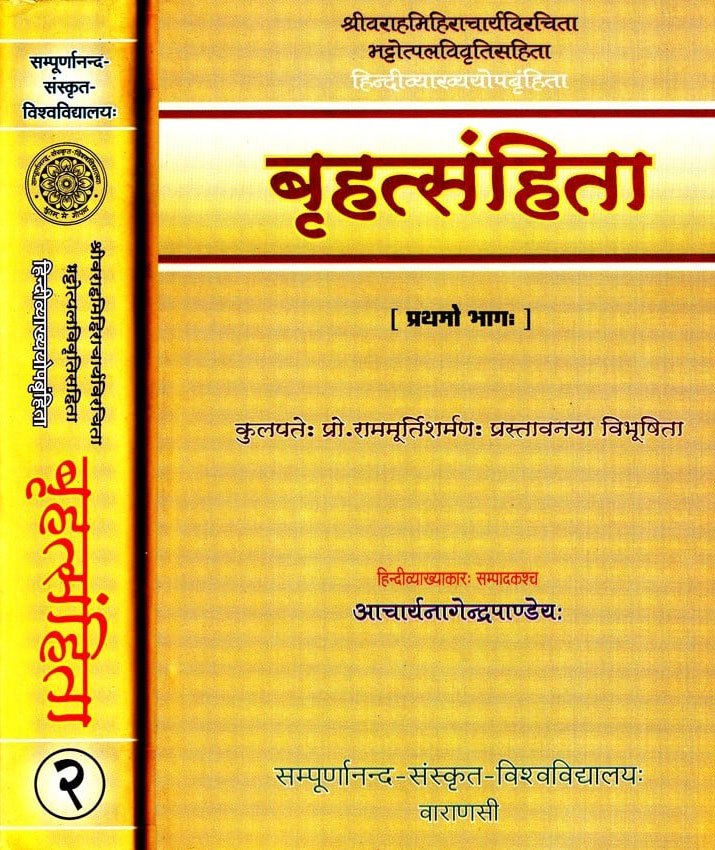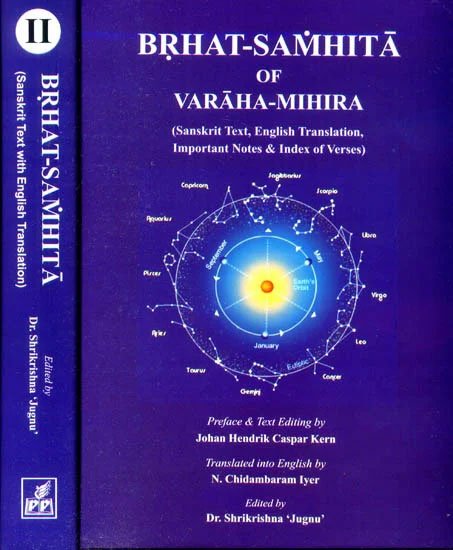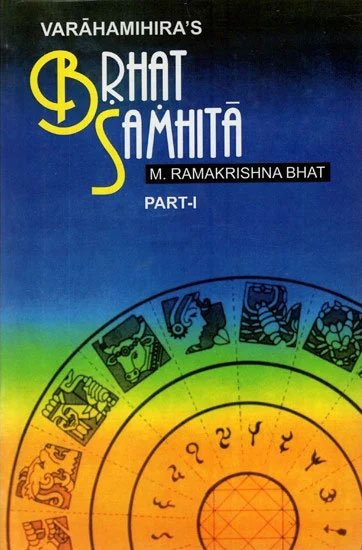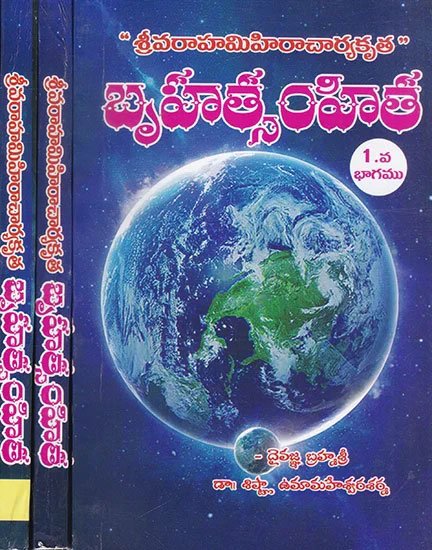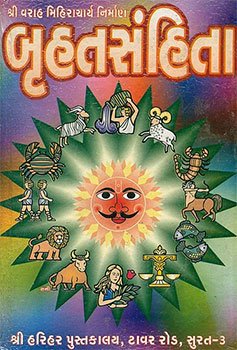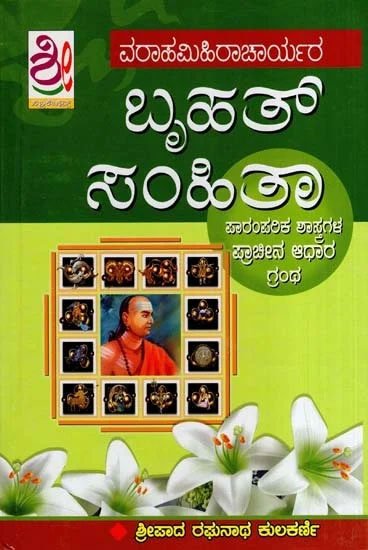Brihat-samhita [sanskrit]
26,560 words
The Sanskrit text of the Brihat-samhita from the 6th-century authored by Varaha Mihira in present-day Ujjain, India. It primarily deals with astrology and astronomy but is presented as an encyclopedia of knowledge.
Verse 19.17
क्षत्रं क्षितौ क्षपितभूरिबलारिपक्षमुद्घुष्टनैकजयशब्दविराविताशम् ।
संहृष्टशिष्टजनदुष्टविनष्टवर्गां गां पालयन्त्यवनिपा नगराकराढ्याम् ॥ १७ ॥
kṣatraṃ kṣitau kṣapitabhūribalāripakṣamudghuṣṭanaikajayaśabdavirāvitāśam |
saṃhṛṣṭaśiṣṭajanaduṣṭavinaṣṭavargāṃ gāṃ pālayantyavanipā nagarākarāḍhyām || 17 ||
The Sanskrit text of Verse 19.17 is contained in the book Brihata Samhita (Sanskrit Text with Hindi Translation) by Pandit Achyutananda Jha. This book is available online or you could buy the latest edition:
Read online Buy now! The Sanskrit text by Pandit Achyutananda Jha (2001)
Glossary of Sanskrit terms
Note: This extracts Sanskrit terms and links to English definitions from the glossary, based on an experimental segmentation of verse (19.17). Some terms could be superfluous while some might not be mentioned. Click on the word to show English definitions.
Kshatra, Kshit, Kshita, Kshiti, Kshapita, Bhuribala, Ari, Arin, Paksha, Udghushta, Naika, Jayashabda, Viravita, Asham, Samhrishta, Shishta, Janat, Ushta, Vinashta, Varga, Palayat, Palayanti, Avanipa, Nagara, Akara, Adhya,
Analysis of Sanskrit grammar
Note: this is an experimental feature and only shows the first possible analysis of the Sanskrit text (Verse 19.17). If the system was successful in segmenting the sentence, you will see of which words it is made up of, generally consisting of Nouns, Pronouns, Verbs, Participles and Indeclinables. Click on the link to show all possible derivations of the word.
- Line 1: “kṣatraṃ kṣitau kṣapitabhūribalāripakṣamudghuṣṭanaikajayaśabdavirāvitāśam ”
- kṣatram -
-
kṣatra (noun, neuter)[adverb], [nominative single], [accusative single]
- kṣitau -
-
kṣit (noun, masculine)[nominative dual], [vocative dual], [accusative dual]kṣita (noun, masculine)[nominative dual], [vocative dual], [accusative dual]kṣiti (noun, feminine)[locative single]kṣiti (noun, masculine)[locative single]√kṣī -> kṣita (participle, masculine)[nominative dual from √kṣī class 1 verb], [vocative dual from √kṣī class 1 verb], [accusative dual from √kṣī class 1 verb], [nominative dual from √kṣī class 5 verb], [vocative dual from √kṣī class 5 verb], [accusative dual from √kṣī class 5 verb], [nominative dual from √kṣī class 9 verb], [vocative dual from √kṣī class 9 verb], [accusative dual from √kṣī class 9 verb]
- kṣapita -
-
kṣapita (noun, masculine)[compound], [vocative single]kṣapita (noun, neuter)[compound], [vocative single]√kṣī -> kṣapita (participle, masculine)[compound from √kṣī]√kṣī -> kṣapita (participle, neuter)[compound from √kṣī]√kṣap -> kṣapita (participle, masculine)[vocative single from √kṣap class 10 verb]√kṣap -> kṣapita (participle, neuter)[vocative single from √kṣap class 10 verb]√kṣī -> kṣapita (participle, masculine)[vocative single from √kṣī]√kṣī -> kṣapita (participle, neuter)[vocative single from √kṣī]
- bhūribalā -
-
bhūribala (noun, masculine)[compound], [vocative single]bhūribalā (noun, feminine)[nominative single]
- ari -
-
ari (noun, masculine)[compound], [adverb]ari (noun, neuter)[compound], [adverb], [nominative single], [vocative single], [accusative single]ari (noun, feminine)[compound], [adverb]arin (noun, neuter)[compound], [adverb], [nominative single], [vocative single], [accusative single]ṛ (noun, feminine)[locative single]ṛ (noun, masculine)[locative single]
- pakṣam -
-
pakṣa (noun, masculine)[adverb], [accusative single]pakṣa (noun, neuter)[adverb], [nominative single], [accusative single]pakṣā (noun, feminine)[adverb]
- udghuṣṭa -
-
udghuṣṭa (noun, masculine)[compound], [vocative single]udghuṣṭa (noun, neuter)[compound], [vocative single]
- naika -
-
naika (noun, masculine)[compound], [vocative single]naika (noun, neuter)[compound], [vocative single]
- jayaśabda -
-
jayaśabda (noun, masculine)[compound], [vocative single]
- virāvitā -
-
virāvita (noun, masculine)[compound], [vocative single]virāvita (noun, neuter)[compound], [vocative single]virāvitā (noun, feminine)[nominative single]
- aśam -
-
aśam (indeclinable)[indeclinable]aśan (noun, masculine)[adverb]
- Line 2: “saṃhṛṣṭaśiṣṭajanaduṣṭavinaṣṭavargāṃ gāṃ pālayantyavanipā nagarākarāḍhyām ”
- saṃhṛṣṭa -
-
saṃhṛṣṭa (noun, masculine)[compound], [vocative single]saṃhṛṣṭa (noun, neuter)[compound], [vocative single]
- śiṣṭa -
-
śiṣṭa (noun, masculine)[compound], [vocative single]śiṣṭa (noun, neuter)[compound], [vocative single]√śās -> śiṣṭa (participle, masculine)[vocative single from √śās class 2 verb]√śās -> śiṣṭa (participle, neuter)[vocative single from √śās class 2 verb]√śiṣ -> śiṣṭa (participle, masculine)[vocative single from √śiṣ class 1 verb], [vocative single from √śiṣ class 7 verb]√śiṣ -> śiṣṭa (participle, neuter)[vocative single from √śiṣ class 1 verb], [vocative single from √śiṣ class 7 verb]√śās (verb class 2)[imperative active second plural]
- janad -
-
janat (indeclinable)[indeclinable]janat (noun, masculine)[compound]janat (noun, neuter)[nominative single], [vocative single], [accusative single]√jan -> janat (participle, neuter)[nominative single from √jan class 1 verb], [vocative single from √jan class 1 verb], [accusative single from √jan class 1 verb], [nominative single from √jan class 2 verb], [vocative single from √jan class 2 verb], [accusative single from √jan class 2 verb]
- uṣṭa -
-
uṣṭa (noun, masculine)[compound], [vocative single]uṣṭa (noun, neuter)[compound], [vocative single]√uṣ -> uṣṭa (participle, masculine)[vocative single from √uṣ class 1 verb], [vocative single from √uṣ class 9 verb]√uṣ -> uṣṭa (participle, neuter)[vocative single from √uṣ class 1 verb], [vocative single from √uṣ class 9 verb]√uch -> uṣṭa (participle, masculine)[vocative single from √uch class 1 verb]√uch -> uṣṭa (participle, neuter)[vocative single from √uch class 1 verb]√vas -> uṣṭa (participle, masculine)[vocative single from √vas class 1 verb]√vas -> uṣṭa (participle, neuter)[vocative single from √vas class 1 verb]√vas -> uṣṭa (participle, masculine)[vocative single from √vas class 6 verb]√vas -> uṣṭa (participle, neuter)[vocative single from √vas class 6 verb]√vaś (verb class 2)[imperative active second plural]
- vinaṣṭa -
-
vinaṣṭa (noun, masculine)[compound], [vocative single]vinaṣṭa (noun, neuter)[compound], [vocative single]
- vargām -
-
vargā (noun, feminine)[accusative single]
- gām -
-
gā (noun, feminine)[accusative single]go (noun, masculine)[accusative single]√gā (verb class 2)[injunctive active first single]√gā (verb class 3)[injunctive active first single]
- pālayantya -
-
√pā -> pālayantī (participle, feminine)[compound from √pā], [adverb from √pā]√pāl -> pālayat (participle, neuter)[nominative dual from √pāl class 10 verb], [nominative plural from √pāl class 10 verb], [vocative dual from √pāl class 10 verb], [vocative plural from √pāl class 10 verb], [accusative dual from √pāl class 10 verb], [accusative plural from √pāl class 10 verb]√pāl -> pālayantī (participle, feminine)[nominative single from √pāl class 10 verb], [vocative single from √pāl class 10 verb]√pā -> pālayat (participle, neuter)[nominative dual from √pā], [nominative plural from √pā], [vocative dual from √pā], [vocative plural from √pā], [accusative dual from √pā], [accusative plural from √pā]√pā -> pālayantī (participle, feminine)[nominative single from √pā], [vocative single from √pā]√pāl (verb class 10)[present active third plural]√pā (verb class 0)[present active third plural]
- avanipā* -
-
avanipa (noun, masculine)[nominative plural], [vocative plural]
- nagarā -
-
nagara (noun, masculine)[compound], [vocative single]nagara (noun, neuter)[compound], [vocative single]
- akarā -
-
akara (noun, masculine)[compound], [vocative single]akara (noun, neuter)[compound], [vocative single]akarā (noun, feminine)[nominative single]
- āḍhyām -
-
āḍhyā (noun, feminine)[accusative single]
Other editions:
Also see the following editions of the Sanskrit text or (alternative) English translations of the Verse 19.17
Brhatsamhita with the Commentary of Bhattotpala
by Krishna Chandra Dwivedi (2016)
Publisher: Sampurnanand Sanskrit University; 1229 pages;
Buy now!
Brihat Samhita with the Commentary of Utpalapatimala of Yogisvara
by K. V. Sharma (2012)
Publisher: Rashtriya Sanskrit Sansthan, Janakpuri; 754 pages; ISBN-10; 8186111360; ISBN-13: 9788186111369
Buy now!
Brihat Samhita (Hindi Translation)
by K. V. Sharma (2002)
Publisher: Sampurnanand Sanskrit University; 2359 pages; ISBN-13: 9789387890008.
Buy now!
Brhat Samhita (English translation)
by N. Chidambaram Iyer (2022)
Publisher: Parimal Publication Pvt. Ltd.; 801 pages; Edited by Dr. Shrikrishna Jugnu; ISBN-10: 8171104215; ISBN-13: 9788171104215.
Buy now!
Brhat Samhita (English with notes)
by M. Ramakrishna Bhat (2010)
Publisher: Motilal Banarsidas Publishers Pvt. Ltd.; 1155 pages; ISBN-10: 8120810600; ISBN-13: 9788120810600.
Buy now!
Brhat Samhita (Telugu translation)
by Sishtla Umamaheswara Sharma (2020)
Publisher: Mohan Publications, Andhra Pradesh; 846 pages.
Buy now!Preview of verse 19.17 in Kannada sript:
ಕ್ಷತ್ರಂ ಕ್ಷಿತೌ ಕ್ಷಪಿತಭೂರಿಬಲಾರಿಪಕ್ಷಮುದ್ಘುಷ್ಟನೈಕಜಯಶಬ್ದವಿರಾವಿತಾಶಮ್ ।
ಸಂಹೃಷ್ಟಶಿಷ್ಟಜನದುಷ್ಟವಿನಷ್ಟವರ್ಗಾಂ ಗಾಂ ಪಾಲಯನ್ತ್ಯವನಿಪಾ ನಗರಾಕರಾಢ್ಯಾಮ್ ॥ ೧೭ ॥
Brhat Samhita (Gujarati translation)
by - (2000)
Publisher: Shree Harihar Pustakalay, Surat; Author: Shri Varahamihira Acharya (શ્રી વરાહમિહીરાચાર્ય); 432 pages.
Buy now!Preview of verse 19.17 in Gujarati sript:
ક્ષત્રં ક્ષિતૌ ક્ષપિતભૂરિબલારિપક્ષમુદ્ઘુષ્ટનૈકજયશબ્દવિરાવિતાશમ્ ।
સંહૃષ્ટશિષ્ટજનદુષ્ટવિનષ્ટવર્ગાં ગાં પાલયન્ત્યવનિપા નગરાકરાઢ્યામ્ ॥ ૧૭ ॥
Brhat Samhita (Kannada translation)
by Sripada Raghunatha Kulkarni (2021)
Publisher: Srinidhi Publications, Bangalore; 668 pages with illustrations.
Buy now!Preview of verse 19.17 in Kannada sript:
ಕ್ಷತ್ರಂ ಕ್ಷಿತೌ ಕ್ಷಪಿತಭೂರಿಬಲಾರಿಪಕ್ಷಮುದ್ಘುಷ್ಟನೈಕಜಯಶಬ್ದವಿರಾವಿತಾಶಮ್ ।
ಸಂಹೃಷ್ಟಶಿಷ್ಟಜನದುಷ್ಟವಿನಷ್ಟವರ್ಗಾಂ ಗಾಂ ಪಾಲಯನ್ತ್ಯವನಿಪಾ ನಗರಾಕರಾಢ್ಯಾಮ್ ॥ ೧೭ ॥
![Brihat-samhita [sanskrit] - book cover](/uploads/a/Brihat-Samhita-Sanskrit.jpg)
